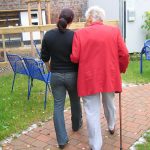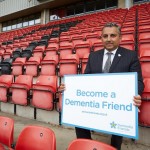Life is a balance between holding on and letting go
(Rumi)
Sometimes dementia can cause a person to experience a different reality to our own, this may include seeing, hearing, tasting or smelling something that isn’t present (hallucinations), inability to recognise objects, people, tastes or sounds (misperception) and/or having a fixed belief that is not true (delusions).
Hallucinations are more common in Lewy body dementia (LBD) and Parkinson’s disease dementia, (although they can occur in Alzheimer’s disease and other types of dementia also). This may include seeing animals or people that aren’t there. This may happen only occasionally or more frequently, sometimes daily. Your loved one’s reality is different to your own at this moment in time and they will have a fixed belief that what they are experiencing is real.
This is usually caused by damage to the area of the brain affected by the dementia and/or changes in their neurochemicals in the brain. Sometimes characters from television may appear very real and appear to be in the room with your loved one. It may be difficult for them to work out what is real and what is virtual from televisions and screens. This may or may not frighten your loved one, but if it does, I would suggest turning off the television and reducing the sensory overload (voices from the radio may also apply here).
If your loved one appears to be experiencing hallucinations, then the first thing to do would be to ask yourself, are they upset by this? Is their behaviour being affected by them? Are they at risk? Are they frightened? Sometimes, people may not be concerned by them, but if they are, here are some tips to help.
Try and stay calm, breathe slowly and try and feel their emotion. Offer comfort and reassurance and acknowledge their feelings by saying something like “this may be frightening for you, but I am here to help.” Sometimes physical reassurance can help by patting them gently on the shoulder when facing them as this may sometimes provide a distraction.
Don’t attempt to challenge them or reason with them, as what they are experiencing is real to them. They are more likely to become upset and agitated if they feel they are not being believed.
Try and find a distraction, sometimes hallucinations may occur in specific settings, if possible, move to another room, go out for a walk, maybe listen to some gentle music, it is often trial and error here and you will get to know what they enjoy doing and what may help.
You may wish to monitor for triggers, such as time of day, what you loved one was doing just before they occur, where they were at the time and how long the hallucination lasted.
What may seem as a hallucination may possibly be more of a misperception, such as mistaking one object for another or mistaking who they are seeing. Sometimes your loved one may not recognise their older self in the mirror and this can be quite frightening.
If a reflection in a mirror causes distress, cover the mirror or get someone to help you attach a blind to it, so that you are still able to use it, but that it is not visible to cause your loved one distress. If they have poor eyesight, make sure they have an up to date appointment with an optician (and a hearing test also) for a check-up. Maybe suggest moving into a different room, declutter the space and change the lighting as sometimes shadows, dark rooms and patterns can cause misperceptions.
Sometimes your loved one may communicate an idea that is false which may appear bizarre and may sometimes be paranoid such as believing that family members are stealing from them. This is a fixed belief and can be very upsetting for family members/friends. Try not to take this personally, avoid challenging the belief or trying to reason, because what is felt is a true reality for your loved one. Once again offer reassurance and try to distract from the delusion, as mentioned above.
People can be mistaken for other members in the family such as a son may be perceived as his father. There may be times when you may want to attempt to bring your loved one back to your reality and sometimes earlier on in the condition it may be possible. But be aware of avoiding confrontation and upsetting them.
As the condition progresses it may be better to let it go and not correct them. Try and stay in the moment, your loved one needs to feel that they are safe and cared for. Following these approaches, however difficult and upsetting it can be, will help you also. If you struggle with this, I would suggest talking to your GP about getting some counselling to help you and to point you in the direction of local support groups.
As I have stressed throughout this book, try and see friends and family and not to isolate yourself. If you are getting good support, you are in a better position to care for your loved one. If these hallucinations and/or delusions continue over time or if they involve a number of senses it is important that you consult your doctor as they may also be caused by other physical complaints such as infections, pain or even side effects to some medication. Let your GP know if there are any triggers (as suggested above), what your loved one sensed and how they reacted.
By Jane Mullins
Jane Mullins
Jane Mullins (RGN, Bn, PGcASR) is a dementia nurse consultant. She has worked on the Memory Teams of Bath and Cardiff, managed a Nursing Home and cared for older people in many hospital settings. Her PhD; A Suitcase Full of Memories explores holiday reminiscence activities for people with dementia and their partners.
She is the creator of DUETcare, Dignity, Understanding and Empathy Training, specialising in training in Dementia and Care of the Older Person. She is involved in a number of creative projects including playfulness and the use of music and playlists for people living with dementia and their partners and families.
This column is here to help you understand what is happening and how the dementia may affect your loved one and offers tips and suggestions to help you. This column is not intended to replace your GP or Specialist Doctor, it is to give a guide to explain what may be happening to your loved one living with dementia and how you may be able to help through adopting interesting and helpful approaches.
Dementia affects people individually and different stages will come with different issues, therefore, the advice here is general and I would always recommend speaking with your doctor.






